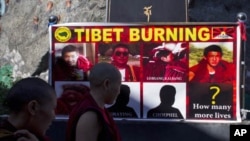Chinese state-run media are accusing Tibetan exiles and unnamed Western governments of pursuing an "anti-Chinese agenda" when describing recent violence in Tibetan areas under Beijing's control.
The official China Daily newspaper is reporting that accounts of the violence from exiles and from Western officials distort the events.
Elected leaders of Tibet's exile community say Chinese security forces fired into a crowd of peaceful protesters last Thursday in southwestern Sichuan province, killing at least six people and wounding more than 60 others. But Beijing acknowledges killing only one so-called "rioter" as "mobs" waged violence against Chinese police.
Spokeswoman and Cabinet Minister for the Tibetan administration in exile, Dekyi Chhoyang, dismisses suggestions they are colluding with Western governments and media to distort events.
“Absolutely not, absolutely not," she says. "The unrest that we are seeing now in the Tibetan region is really a reaction by the Tibetan people to the repressive policies of the Chinese government. And what we are saying to [China] is 'listen to the people.'”
At least 16 Tibetans, mainly Buddhist monks and nuns, have set themselves on fire to protest what they view as repressive policies in the region. Many of the protests have been spurred by police trying to arrest activists who were posting leaflets declaring self-immolations will continue until Tibet is free.
The Tibetan-exile administration says it never encourages fellow Tibetans under Chinese control to protest, but that it is sensitive to their concerns.
Cabinet Minister Chhoyang says there is a definite risk of escalation if the Chinese do not listen to Tibetan concerns, adding that many in the administration are concerned of a repeat of widespread that riots broke out in China's Tibetan autonomous region in 2008.
“It is bound to resurface ... it is only going to increase, I think," she says. "We are facing a younger generation who are more vocal, who are willing to make their grievances known.”
China occupied Tibet in 1950. Tibetan spiritual leader, the Dalai Lama, crossed into India in 1959 along with tens of thousands of supporters. Chhoyang says many of the current protesters have no personal memories of those historical episodes.
“A lot of the people who have protested are in their 40s and younger, Tibetans who were born and grew up after China occupied the Tibetan plateau," she says. "So, they have never known an independent Tibet. They grew up under the Chinese regime, so there is something seriously wrong that we need to listen to.”
No foreigners are being allowed into Tibetan areas under Chinese control. Tibet's exile Prime Minister Lobsang Sangay has called for the United Nations to send a fact-finding team to the region.
Tibetan Exiles to Beijing: Violence 'Unsustainable'
- By Kurt Achin
